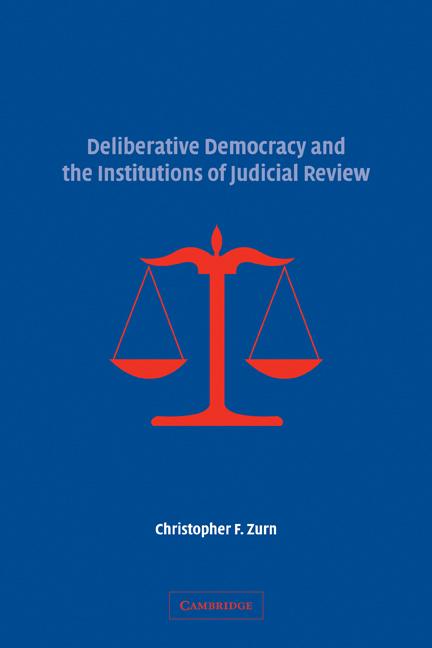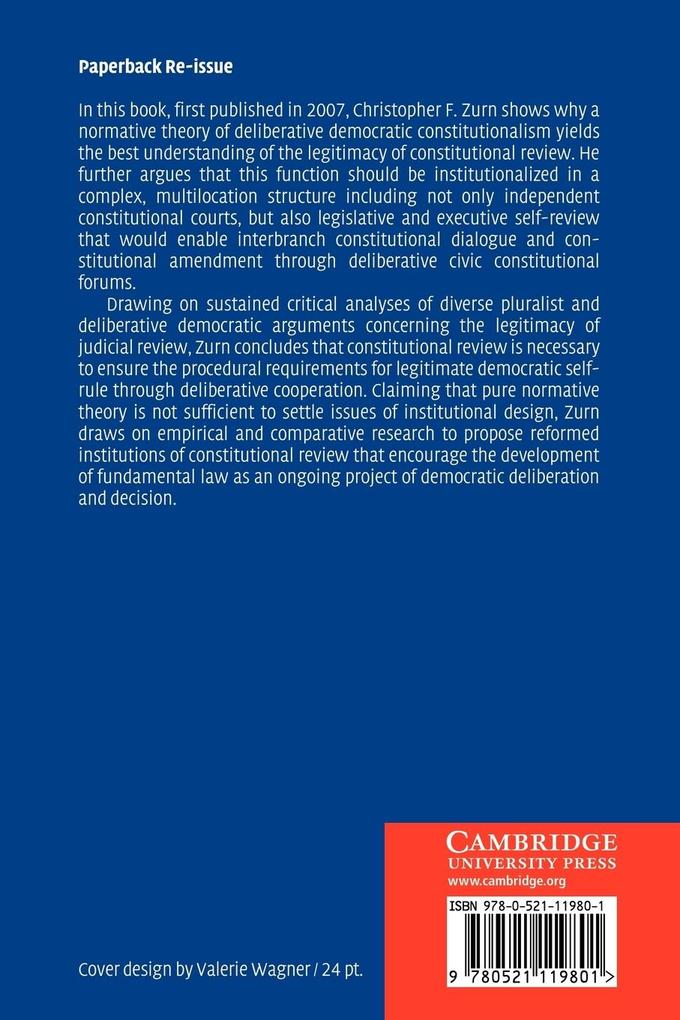
Zustellung: Mo, 23.06. - Do, 26.06.
Versand in 6 Tagen
VersandkostenfreiBestellen & in Filiale abholen:
Zurn examines the legitimacy of constitutional review using a normative theory of deliberative democratic constitutionalism.
Inhaltsverzeichnis
Part I. Introduction: 1. An old chestnut is actually two; 2. Pathologies of ad hoc triangulation; 3. Functions and institutions; Part II. Majoritarian Democracy and Minoritarian Constitutionalism: 4. Judicial review as substantially legitimate protection of minority rights; 5. Judicial review as procedurally legitimate protection of democracy; 6. Moving beyond aggregative majoritarianism and minoritarian constitutionalism; Part III. From Majoritarian to Deliberative Theories of Constitutional Democracy: 7. Deliberative democracy: four axes of analysis; 8. Constitutionalism: four central elements; 9. Constitutional democracy?; Part IV. Deliberative Democracy and Substantive Constitutionalism: 10. Keepers of the substantive flame of American exceptionalism; 11. Guardians of the moral law in the forum of principle; 12. Are substantialist defenses of judicial review self-defeating?; Part V. Disagreement and the Constitution of Democracy: 13. Democratic precommitment to judicial review: Freeman; 14. Deliberative majoritarianism and the paternalism of judicial review: Waldron; 15. Upshot: we need a theory of democratic constitutionalism; Part VI. The Seducements of Juristic Discourse as Democratic Deliberation: 16. A division of labor between juristic deliberation and populist aggregation?; 17. Actual juristic discourse in the United States system of constitutional adjudication; 18. Legal principles and moral-political reasoning; Part VII. Constitutionalism as the Procedural Structuring of Deliberative Democracy: 19. A provisional summary: criteria for an adequate theory of constitutional review; 20. Guardians of the conditions of procedural legitimacy: Habermas; Part VIII. The Institutions of Constitutional Review I: Design Problems and Judicial Review: 21. The problems of designing institutions of constitutional review; 22. Independent constitutional courts in a concentrated review system; Part IX. The Institutions of Constitutional Review II: Horizontal Dispersal and Vertical Empowerment: 23. Self-review panels in the legislature and regulatory agencies; 24. Mechanisms for inter-branch debate and decisional dispersal; 25. Easing formal amendability requirements; 26. Establishing civic constitutional fora.
Produktdetails
Erscheinungsdatum
30. Mai 2009
Sprache
englisch
Seitenanzahl
376
Autor/Autorin
Christopher F. Zurn
Verlag/Hersteller
Produktart
kartoniert
Gewicht
609 g
Größe (L/B/H)
229/152/22 mm
ISBN
9780521119801
Entdecken Sie mehr
Pressestimmen
Review of the hardback: 'The book, in short, has several merits. The main one, probably, is to refine the old discussion of judicial review in the light of an open institutional scenario, without assuming a readymade parochial design imposed by history and without ignoring the increasing empirical and comparative data about institutional performance produced in the last decades.' Cambridge Law Journal
Bewertungen
0 Bewertungen
Es wurden noch keine Bewertungen abgegeben. Schreiben Sie die erste Bewertung zu "Deliberative Democracy and the Institutions of Judicial Review" und helfen Sie damit anderen bei der Kaufentscheidung.









